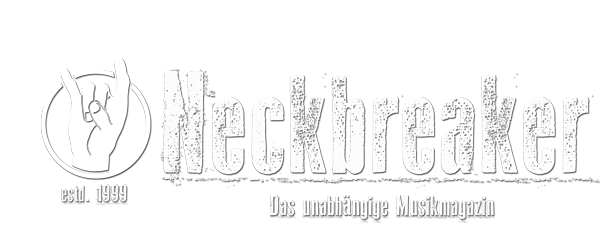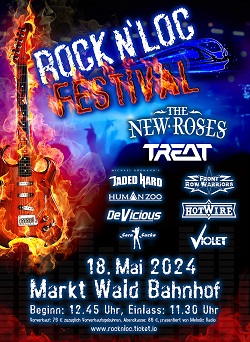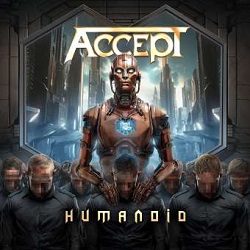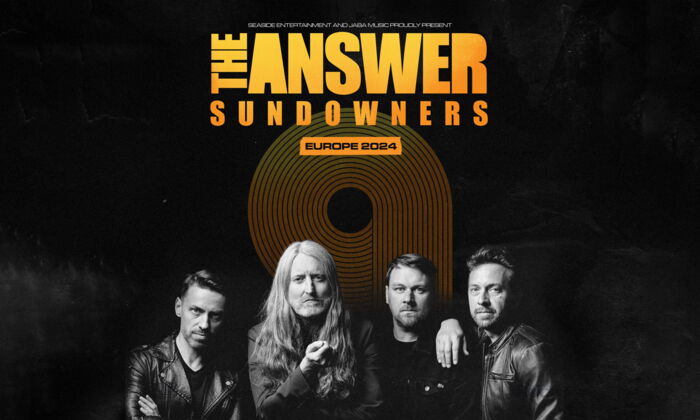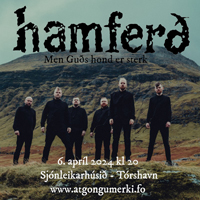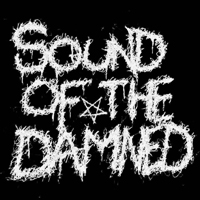 That metal is spread all over the world is nothing new. Even in the furthest corner, even in the most unlikely places, yes, even in dictatorships where it is prohibited, you can still find metal bands. But how many of those bands do you actually know? I’m pretty sure nobody here knows a single metal band from Greenland. And I was no exception. The country, which belongs to the Kingdom of Denmark, but is mostly self-governed, is the biggest island of the planet and it is so huge and so scarcely inhabited, that there are no roads connecting the villages and cities, simply because distances are too vast and it would be too expensive to maintain a road you can’t use for most of the year due to weather conditions. If you want to go to another village you have to take a boat or a plane. So, how did I get to know a Greenlandic metal band? I kind of knew they existed for quite some time, because singer Sebastian Enequist was singing one song on Faroese GORESQUADs latest EP. And when I was on the Faroes in February and our mutual friend Theodor [Kapnas] told me that SOUND OF THE DAMNED would be there at the same time to record their first album it was quite obvious that I had to do an interview. So I first visited them in studio Bloch in Tórshavn where they are recording their debut album with Theodor and later I met Sebastian Enequist, Tuka Allarneq Nielsen Lyberth, Hermann Josefsen and Josva Kristian Møller to have a chat about their upcoming album (which will be released on October 1st) and metal in Greenland.
That metal is spread all over the world is nothing new. Even in the furthest corner, even in the most unlikely places, yes, even in dictatorships where it is prohibited, you can still find metal bands. But how many of those bands do you actually know? I’m pretty sure nobody here knows a single metal band from Greenland. And I was no exception. The country, which belongs to the Kingdom of Denmark, but is mostly self-governed, is the biggest island of the planet and it is so huge and so scarcely inhabited, that there are no roads connecting the villages and cities, simply because distances are too vast and it would be too expensive to maintain a road you can’t use for most of the year due to weather conditions. If you want to go to another village you have to take a boat or a plane. So, how did I get to know a Greenlandic metal band? I kind of knew they existed for quite some time, because singer Sebastian Enequist was singing one song on Faroese GORESQUADs latest EP. And when I was on the Faroes in February and our mutual friend Theodor [Kapnas] told me that SOUND OF THE DAMNED would be there at the same time to record their first album it was quite obvious that I had to do an interview. So I first visited them in studio Bloch in Tórshavn where they are recording their debut album with Theodor and later I met Sebastian Enequist, Tuka Allarneq Nielsen Lyberth, Hermann Josefsen and Josva Kristian Møller to have a chat about their upcoming album (which will be released on October 1st) and metal in Greenland.
Anne: Where in Greenland are you from? Are you all from the same city?
Hermann: No. I live in Denmark, Aalborg and the rest of them lives in Nuuk, the capital of Greenland.
Anne: How did you get to know each other? How and when did you get in touch with metal and when did you decide to form a band?
Sebastian: That’s a funny story. Me and Tuka are brothers and back then I was just getting to know Josva. It was just five days before a music competition so my wife pushed me to form a band, she said “Call your friends, come on, let’s do this!”. She convinced me to do it, I called Tuka, the drummer, and I was the guitarist so I was in the need of a bassist and so I asked Josva first to be the bassist and there was this other guy, I asked him to be a vocalist. So in the beginning we had a growler, or screamer. And then we rehearsed for five days and in the end we won the competition.
Anne: That is cool!
Sebastian: It is really cool, yeah.
Anne: So you, as a band, were not even a week old when you won the competition.
Josva: Yes, barely even a week. I think it was mostly four days for three songs and it’s quite funny how we came together. It was mostly for the competition. And to be honest, I personally didn’t think that we would win the competition. I was just glad to play music and be on stage and yeah, the rest is history.
Sebastian: I remember it were five days before the competition. We wrote three songs and then there was one song that I had already written and every day we did a song, finished it and on the next day we wrote a new song. Those days were pretty intense, but it was nice.
Anne: How are you practicing now with Hermann living in Denmark so you don’t see each other very often? Do you even practice?
Hermann: They write new music and they have to record it in the home studio. Drums, guitars and vocals - and then they send it to me so I can record the bass and send the bass track back so they can put it together. That’s how we work.
Sebastian: Basically long distance practice.
Josva: Nowadays, it’s mostly three or two of us who practice together. I mostly practice at home. Mostly an hour, I just play a bit. I don’t really feel like practicing but of course I need to.
Anne: Are there possibilities for metal bands to play in Greenland?
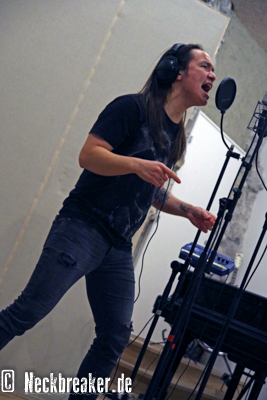 Sebastian: There are multiple stages, especially in Nuuk. There is a club called NUIF, and once in a while they have an open stage, everybody can get up and show what music they have. Also in a pub there is usually a jam night, every two weeks there is an open stage, where everybody can participate and play whatever they want to play. Once a month in Katuaq, Nuuks biggest café, and every week in a pub there are a live shows with different bands. They get to have three times 45 minutes and they play different songs, cover and their own so there is a lot of music going on. But not quite Heavy Metal.
Sebastian: There are multiple stages, especially in Nuuk. There is a club called NUIF, and once in a while they have an open stage, everybody can get up and show what music they have. Also in a pub there is usually a jam night, every two weeks there is an open stage, where everybody can participate and play whatever they want to play. Once a month in Katuaq, Nuuks biggest café, and every week in a pub there are a live shows with different bands. They get to have three times 45 minutes and they play different songs, cover and their own so there is a lot of music going on. But not quite Heavy Metal.
Anne: Yeah, so there’s nothing like a metal club?
Josva: There is a place where they play rock, almost like metalish, once in a while. They do have big stages in Inussivik and Katuaq. There are the biggest stages you could play.
Anne: Are there other metal bands from Greenland that you could recommend?
Sebastian: Yes, quite a few, actually. There is one iconic band - or Heavy Metal iconic band - we have to mention, is called SIISSISOQ, they’re from Uummannaq, from the north of Greenland. They released an album twenty years ago, I think in 2000 something.
Josva: Early 2000s.
Sebastian: Or maybe late nineties. Yeah, that’s Greenland’s biggest Heavy Metal band.
Josva: Yes, they kind of revolutionized the genre in Greenland and they kind of started Metal and Dance in Greenland.
Hermann: And I can also recommend PUKUUT. They are also from further north. Quite similar to Death Metal, but maybe more Heavy Metal inspired.
Sebastian: They have their own way, it’s more like Modern Metal, they sound modern.
Josva: It’s not necessarily Metal though, but somewhere in that area.
Sebastian: As Theodor said: Polished Metal.
Anne: From a musician’s point of view, do you regret being from Greenland? I mean, if you would play the same music in Germany, it would be very easy for you to get possibilities to play gigs, make a short tour or something like that. But from Greenland, just the flight is so expensive. Do you regret being from Greenland? Just from that point of view?
Hermann: I think we can say there are two perspectives about that question. First of all, we are very proud of being one of the first Death Metal bands in Greenland. There used to be a few Death Metal bands, but they are not continuing as bands. The other perspective is: it is hard to go anywhere else and go touring and recording albums and the possibilities are few.
Josva: I’m proud of being from Greenland. It kind of teaches you to be more open about Heavy Metal. Because back home in Greenland there are not many people who listen to it. And it’s still – I don’t know how to put it in words – kind of being looked down on. For example, when we are Heavy Metal listeners who also play Metal and it’s very common to get put down, just because we listen to Metal and that makes you want to work hard on music. Standing together and believing in what you do. And of course the traveling side of it is very expensive, but yes, I am very proud of being from Greenland because it makes you who you are by hard work.
Anne: That could be an answer to my next question: What do you love about Greenland, how much influence does that have on your music?
Sebastian: I would like to say something about the previous question first. Yes, it’s very challenging, you know. Flights are quite expensive, also for the gear we have to bring it’s pretty expensive. But you have so much support in people. Like for example family or other musicians, who don’t even play Heavy Metal. We have such a supportive community in music in Greenland, there are a lot of people: “Yeah, you can do it!”. And when we do it, they are also proud and you can feel the support. I think it’s quiet important. Even though it’s challenging I don’t think it’s regretful.
Anne: So what do you love about Greenland, how much influence does that have on your music?
Sebastian: I love our culture, because it’s not only Greenland’s culture. But it’s all over Canada, Alaska, we have the same culture, but yet very different.
Josva: What I love about Greenland? Well, it’s mostly the people. There’s a lot of support and since Nuuk is not a very big town you know a lot of people and when you go out you might meet at least five people you can talk to and there’s always a talk, there’s always a chat going on. And we know a lot of people and we can get information easily from people or inform people. And the weather of course. I mean, basically all of it.
Anne: Are there possibilities for you to record in Greenland or why did you choose to get here?
Sebastian: Of course we had millions of opportunities to record in Greenland. Someone asked me to record in Pukuut studio - the one we mentioned earlier. It’s still expensive to fly north and yes, it would make sense if we would record there. But back in 2019 we were in Arctic Sounds [a music festival in Sisimiut] and we were able to record one song with Theodor. That was the first time we met him, and we did one song in one day and it went really well, and we got along really awesome, he was such a cool dude and we kind of fell in love with him. (laughs).
“It doesn't feel like work. It just feels like home.”
Josva: It was quite easy to work with him. One song in one day. And I think especially the production and the sound are the reasons why we choose to record in the Faroe Islands. Because of how good it sounded.
Anne: So basically Theodor is the reason.
Sebastian: Yes, pretty much.
Anne: You haven’t really published any songs apart from the two acoustic pieces on YouTube and the one on Spotify. Did you get any reactions from outside of Greenland so far?
Sebastian: Yes! There is a guy in Brazil, who asked if they could present our band. It was way before we met Theodor, actually. We made three demos in a youth club in Nuuk. And we published it on Soundcloud and some of the guys from Brazil wrote an article about us.
Anne: Cool! It is a bit weird that you have been found by someone from Brazil. How is the feedback from Greenlanders?
Sebastian: Very positive. So nothing like “Oh my god, you’re so horrible!”. We received very positive reactions.
Josva: Surprisingly positive feedback.
Hermann: They took it quite well and I think they were more surprised than us.
Anne: You are just recording your first album. How is it going?
Sebastian: It’s going very well! I don’t think we’re late on it or delayed or anything. It’s going pretty well. We’re finishing it up.
Hermann: It doesn’t feel like work. I mean, even though we wake up early in the morning to record until dinnertime. It’s going really well. And I totally agree with Sebastian, there are no delays, no setbacks, everything just feels like it’s supposed to be. So that’s the fun part of recording every day, all day.
Tuka: We have two weeks for recording, and it goes really well.
Josva: It is quite a pressure. It’s not like it’s difficult or something, but it’s quite motivating to get it done. And like Hermann said, it doesn’t feel like work. It just feels like home.
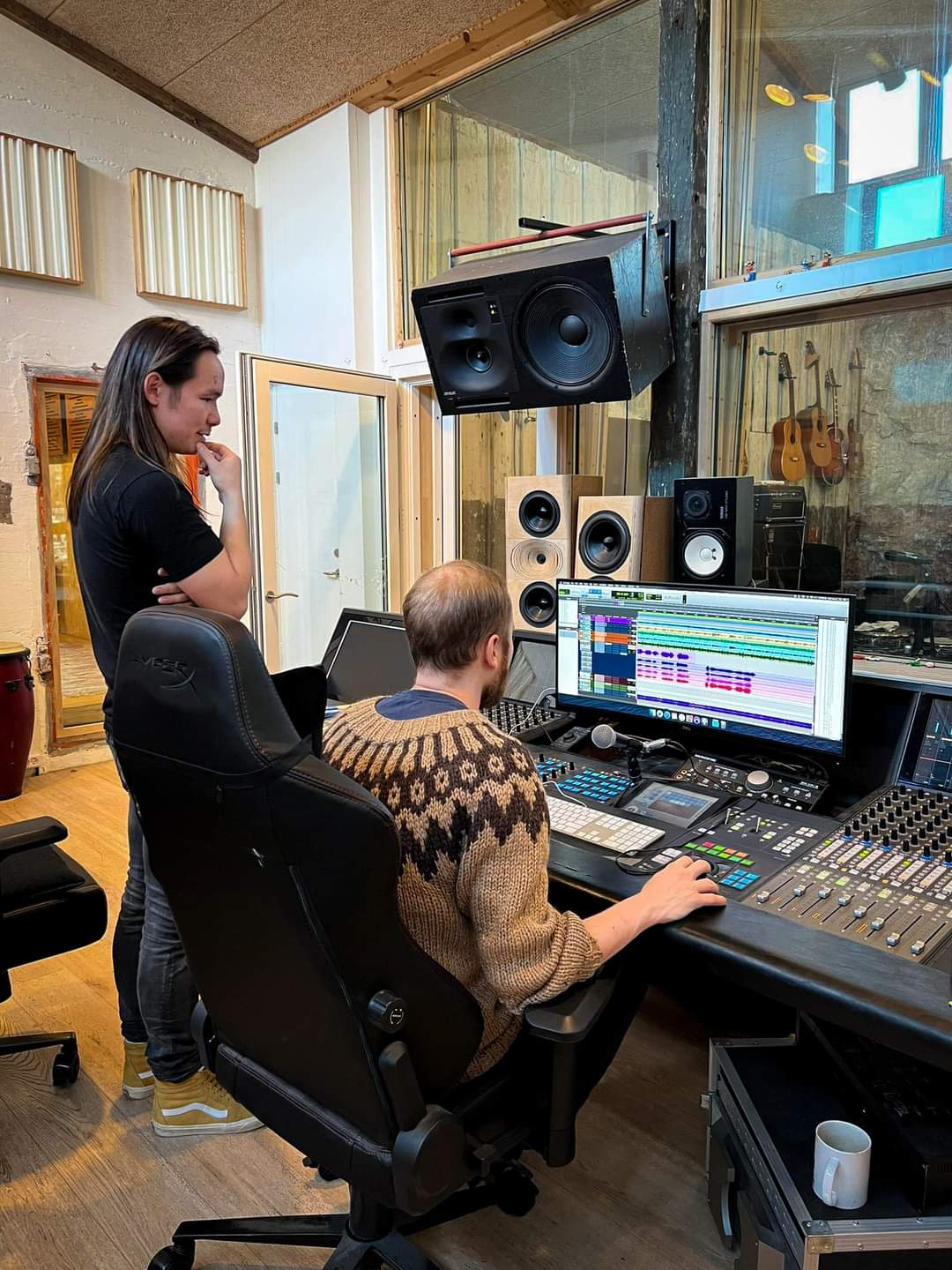 Anne: Do you get some support by a label maybe or some sponsors or something like that?
Anne: Do you get some support by a label maybe or some sponsors or something like that?
Sebastian: We have applied to a lot of funds. We don’t have a label. We’re planning on publishing it ourselves, but of course we talked about labels but we haven’t worked on it yet. So all we have is like a recording and we will take it from here. But we will look into it.
Anne: We talked a lot about the album now, but what is actually the name of it?
Sebastian: That’s a good question.
Josva: I thought about a self-titled album or I don’t know. We have no idea (laughs). It’s not a suggestion, just a thought. We haven’t even discussed it. At least it’s Sound Of The Damned.
Anne: What can the listener expect?
Sebastian: There’s a lot of dirt. (laughs). I think all the songs are quite different. Not that there are growls and high clean singing, but, you know, sometimes it’s all the way Death Metal, but sometimes it’s Death Metal and a little bit of clean singing.
Josva: There are a lot of nuances, it’s not just a Death Metal album. There is also clean stuff going on, singing-wise and guitars and melodies and melodic parts and slow and fast. I mean it’s not just one genre. They can expect the album to be epic, melodic and definitely a journey to listen to.
Anne: What are your goals, expectations or dreams for this album?
Sebastian: One of the dreams would be to make a music video, and to play shows. Maybe we could reach a certain festival, called Copenhell, it would be so, so nice to be there or just in any Metal festival. Because we haven’t been on a Metal festival or something like that. So it would be awesome to play on a Metal festival.
Josva: That would be a dream coming true.
Anne: I’ll keep my fingers crossed! What is the album about, is it some kind of a concept album or do you have an overall topic you write about?
Sebastian: We don’t have an overall topic. Each song has its own message or has its own story. The thing is, we have our own songwriter. That would be our manager aka my wife, Pani Enequist. She does our songwriting, she does our lyrics, almost all of the songs. I mean, some of our songs I did with her.
Anne: So what comes first: The music or the lyrics?
Sebastian: The Lyrics.
Anne: So she writes the lyrics and you write the music around it?
Sebastian: Yes, exactly.
Anne: What inspires you – or her?
Sebastian: Sometimes we all get together and discuss what could be a song. Get some ideas and write things down. We did that for “My Monster” and also “Tartarus”. And sometimes she just writes. She writes a lot, out of passion and sometimes we just discuss it daily. “This would be awesome”. So sometimes we write together and do our little feedback and it becomes a song. Especially with “Inuk Uummarit” we wrote that down, both of us. She did the most of it, yes, and I was a small part of it. But she wrote a lot of strong lyrics. A lot of emotions in there.
Anne: The lyrics on this album will be partly in English and partly in Greenlandic. Why did you choose it to be that way?
Sebastian: Yes, half of our songs are in English and the other half is in Greenlandic. The idea behind it is: We wanted to do English, because, you know, we grew up listening to english Metal songs and that influenced us a lot and we also wanted to do Greenlandic Death Metal songs. That would be awesome. Because it’s our own language. So it’s our way, or, well, my own way to express. It makes sense to split it in half. Instead of having all in English or all in Greenlandic.
Anne: How do you decide which song gets which language? Does it just happen or is it a conscious decision?
Sebastian: In the Greenlandic songs the content is a lot about Greenlandic culture or Inuit culture. Especially “Inuk Uummarit”. It has a lot to do with our culture. You know, colonizing our land, decolonizing, it came from that emotion. Also with “Atornerlunnanga”. How do you say it?
“It is a taboo, it just makes sense to put it on music.”
Josva: There is quite a lot of abuse in Greenland which is considered to be a taboo. I remember discussing it when we were putting it together and Sebastian’s wife, she mentioned she wanted to break the taboo by creating the song. And that’s the meaning behind “Atornerlunnanga”.
Sebastian: Well said.
All: Well said.
Anne: That has of course to be in Greenlandic. So it depends a bit on the topic.
All: Yes.
Josva: I mean, that topic is quite heavy and pretty honest. It is a taboo, it just makes sense to put it on music. It has a strong meaning behind it. It’s a meaningful song.
Anne: I’ve only heard one song so far, or well, two, if you include the one that is on Spotify and it’s rather typical Death Metal. Do you also use traditional instruments or elements of traditional music?
Sebastian: Well, in one song, which is called “Kilertiterlunga Aaverullunga”, there is some drum dancing. It’s not quite the same, but it’s in the vein of drum dancing.
Josva: And we replaced the drum part with proper drums.
Anne: And do you also use the famous deep throat singing? Which people from the outside consider typical Greenlandic.
Sebastian: No, we did not use deep throat singing.
Josva: Let’s just say it’s an homage to drum dancing and singing. An homage, but the approach is more modern with modern music.
Anne: What you told me up to now, your songs are often about the current social situation in Greenland and that is a rather hard or complicated situation, as I get it. Does your name also refer to that situation? Or where does you band name come from?
Sebastian: That is also a funny story, because at first we couldn’t decide what band name we should have. We were brainstorming in one of the rehearsal rooms and we were almost considering naming our band ANORI. I liked it. I like the name, I love it. But it was already taken. And at that point we – Hermann wasn’t with us until 2018 - at that point it was me, Tuka, Josva and our former vocalist and all of us could growl and scream and from that point of view we were like sound of the damned. It sounded right at the time.
Anne: What would you wish to happen for the social situation to change?
Sebastian: Break the taboos, get out of your comfort zone, …
Josva: Getting accepted for being a metal head, for listening to Heavy Metal. I mean, nobody should be ashamed for listening to Heavy Metal and nobody should be put down just because of listening to Heavy Metal. Just be yourself. Don’t be afraid to come out, be accepting and just be accepted. And make the world a better place.
Anne: Your song “My Monster” is about the Tupilaq. Can you tell me a bit me about it?
Tuka: It was actually my idea to call the song “My Monster”. Because one day I wanted to write a song - about my monster and that monster would kind of be a metaphoric monster inside of me telling me to feed it. Or fear it. And I recommended it to my brother and his wife, my sister-in-law, and they took it very well and made a song out of it. And I wrote a few riffs in there, and that’s how it started.
Josva: It’s about that mythical creature, Tupilaq, that metaphorically became my monster. If that makes sense.
Sebastian: Yeah. The lyrics are not quite about a Tupilaq, not specifically, but it is about Tupilaq things.
Anne: So that’s just a connection?
Sebastian: Yes, it’s a connection.
Anne: And then I have a question especially to you, Sebastian, because you have those interesting traditional facial tattoos. Can you tell me more about it? Can men and women get the same tattoos or are there different tattoos for each sex? Also, they probably have a meaning. Can you just tell me something about it?
Sebastian: Women and men have different patterns. Those chin tattoos here [points to his chin tattoos] are usually women’s patterns. Especially those here on the chin. Some of the men’s patterns can be a bit weird. Different from women of course. Our ancestors were hunters so from their experience hunting grounds developed, some of their patterns can be based on their hunting. What they have caught and what they've achieved in hunting. I cannot tell you the whole story because I don’t know everything. But it can also be about animals, such as ravens.
Anne: Are there some tattoos you have to earn? That you have to achieve something to be allowed to have them?
Sebastian: The tattoo artist that did these [points to his nose tattoos], she told me that these markings can be… she described it like men who achieved the most could have these markings here. Especially this maybe [points to one of the nose tattoos]. I don’t quite remember how it is, but you can read it online. There is no way I could tell you and sound smart. I recommend to do that online, on a proper website.
Anne: It’s probably pretty complicated?
Sebastian: It’s not quite complicated, but every marking has its own story. And I’m proud of who I am. I respect my ancestors. These are my markings, this is my respect for my ancestors. Those are my reasons. One of my reasons.
Anne: Those were my questions. Thank you very much for the interview!
Josva: Thank you very much for doing this!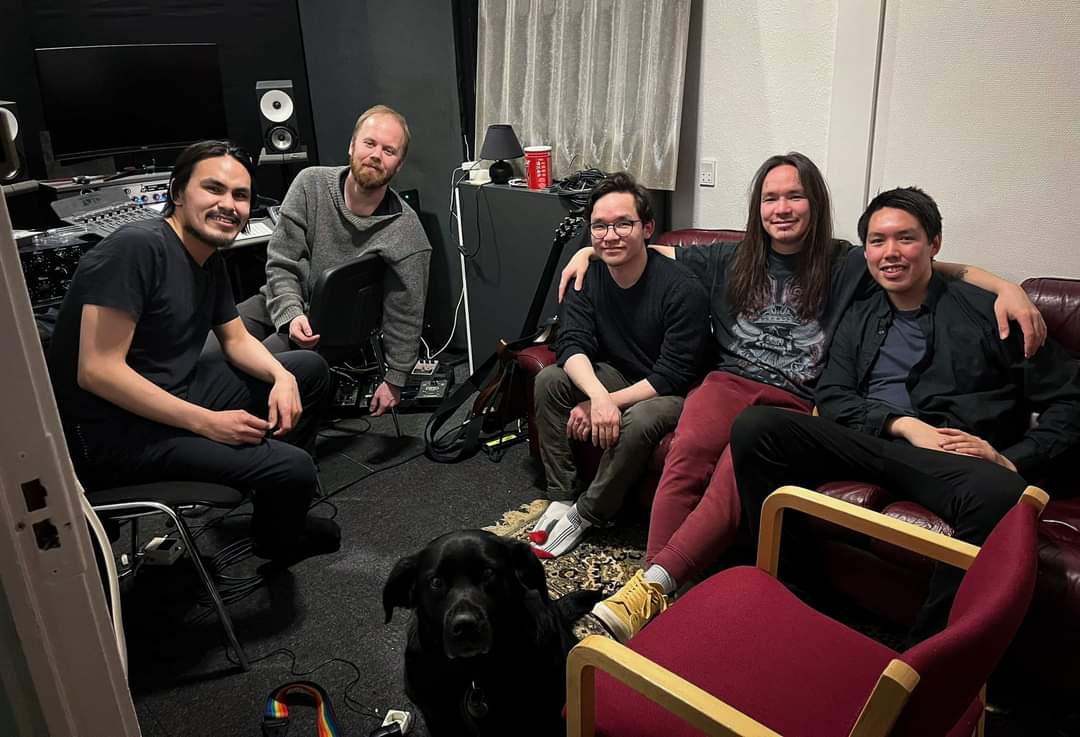
Interview: Anne
Fotos: Nr. 1: Anne, Nr. 2: Tuka Allarneq Nielsen Lyberth, Nr. 3: Sanna Laksá
